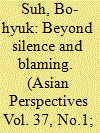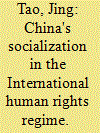| Srl | Item |
| 1 |
ID:
118416


|
|
|
|
|
| Publication |
2013.
|
| Summary/Abstract |
Despite over a decade of collective efforts on the part of the international community, the North Korean human rights issue remains prevalent and pervasive. I propose "Korean human rights" as an alternative concept and approach for South Korea to constructively contribute to improving the human rights situation in North Korea. The notion of Korean human rights can be used as a method to overcome the limitations that both South Korea and the international community have faced in the past and a framework for effectively applying international human rights conventions at the regional level.
|
|
|
|
|
|
|
|
|
|
|
|
|
|
|
|
| 2 |
ID:
141456


|
|
|
|
|
| Summary/Abstract |
This article uses a hard law—the Rome Statute of the International Criminal Court—to examine the depth of China's socialization in the international human rights regime and the relative weights of sovereignty and human rights norms in determining China's policy choices. It shows that the reasons for China's rejection of the Rome Statute are twofold. On the one hand, Chinese leaders have not fully internalized human rights norms, and they prioritize state sovereignty over human rights when making decisions. On the other hand, the legalized Rome Statute sets up an independent court with mandatory jurisdiction and grants the Prosecutor the ex officio right to investigate a crime. Such treaty provisions may have negative impacts on China's core sovereignty of territorial integration and regime security, thus imposing high sovereignty costs on China. Therefore, China resolutely voted against the Rome Statute, even if such an action made it a small minority outside the international mainstream. These findings indicate that China is still in a weak socialization stage and is not able to take on binding human rights and humanitarian obligations with high sovereignty costs.
|
|
|
|
|
|
|
|
|
|
|
|
|
|
|
|
| 3 |
ID:
185009


|
|
|
|
|
| Summary/Abstract |
Conventional wisdom treats politicization in the international human rights regime as invariant: for any given violation, states condemn adversaries while coddling friends. However, we find that politicization patterns vary markedly across human rights issues. Some norms are more politicized than others, and states are more likely to punish geopolitical partners on certain violations. We offer a novel theory of politicized enforcement wherein states punish human rights violations discriminatively based on their perceived “sensitivity” for the target state. Using data from the UN Universal Periodic Review, an elaborate human rights mechanism, we show that states tend to criticize their adversaries on sensitive issues that undermine the target regime’s power and legitimacy while addressing safer topics with friends. By uncovering a strategic logic of human rights enforcement, this research contributes new theoretical insights on the relationship between norms and power politics in global governance.
|
|
|
|
|
|
|
|
|
|
|
|
|
|
|
|
| 4 |
ID:
139523


|
|
|
|
|
| Summary/Abstract |
Among the explanations for state ratification of human rights treaties, few are more common and widely accepted than the conjecture that states are rewarded for ratification by other states. These rewards are expected to come in the form of tangible benefits—foreign aid, trade, and investment—and intangible benefits such as praise, acceptance, and legitimacy. Surprisingly, these explanations for ratification have never been tested empirically. We summarize and clarify the theoretical underpinnings of “reward-for-ratification” theories and test these propositions empirically by looking for increased international aid, economic agreements, and public praise and recognition following ratification of four prominent human rights treaties. We find almost no evidence that states can expect increased tangible or intangible rewards after ratification. Given the lack of empirical support, alternative explanations seem more appealing for understanding human rights treaty ratification.
|
|
|
|
|
|
|
|
|
|
|
|
|
|
|
|